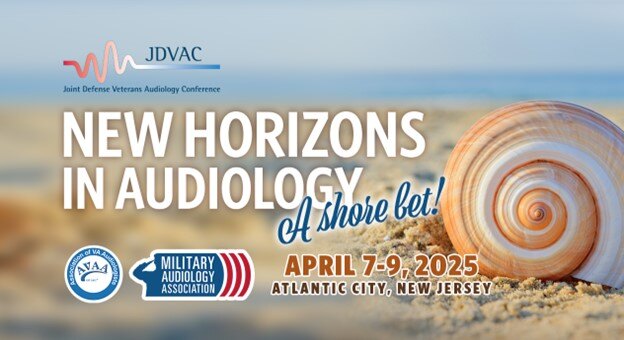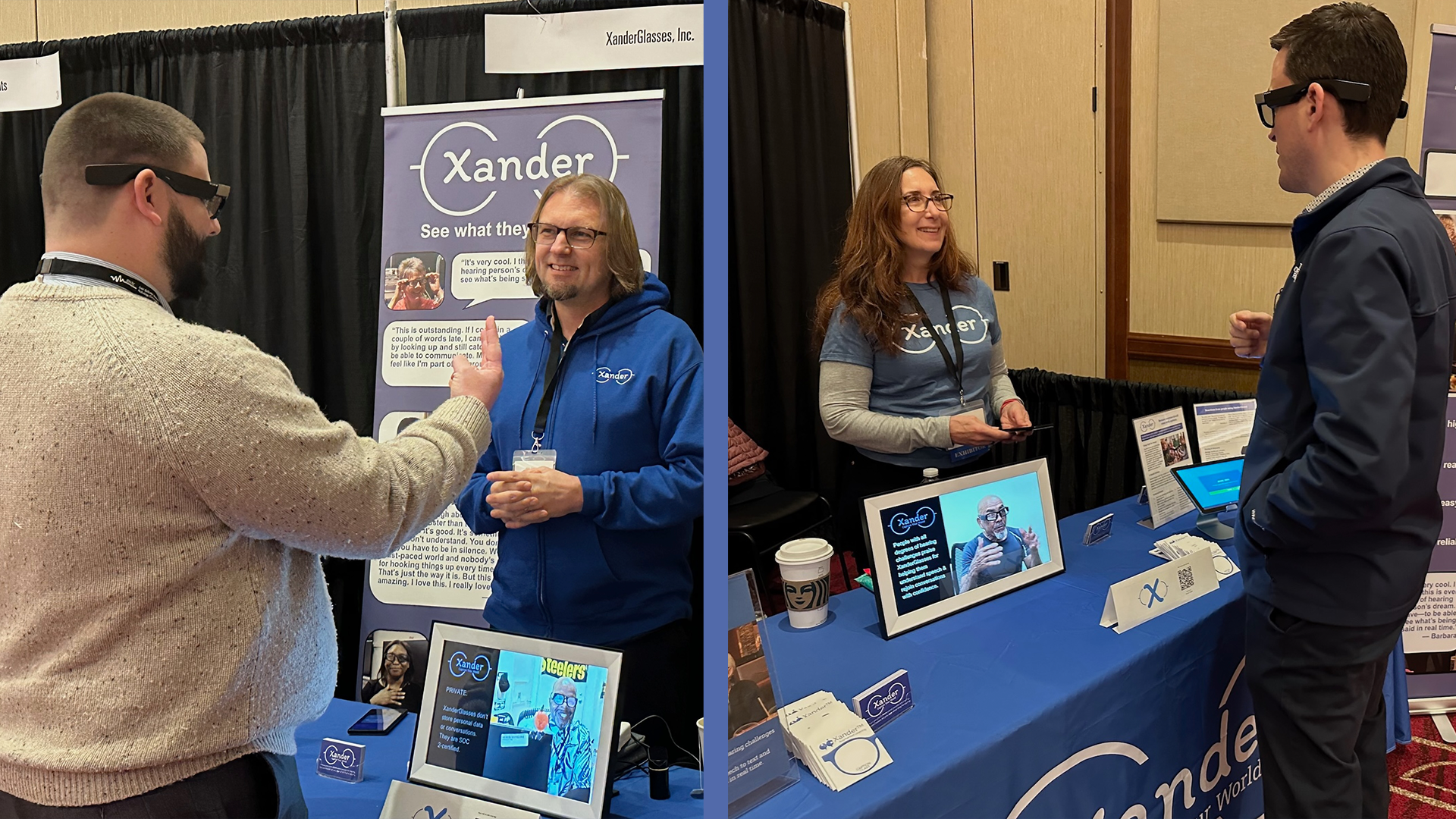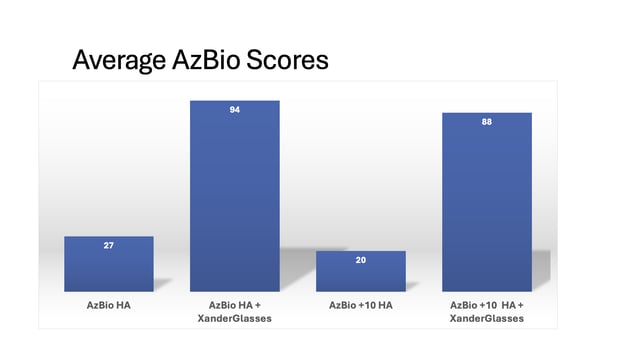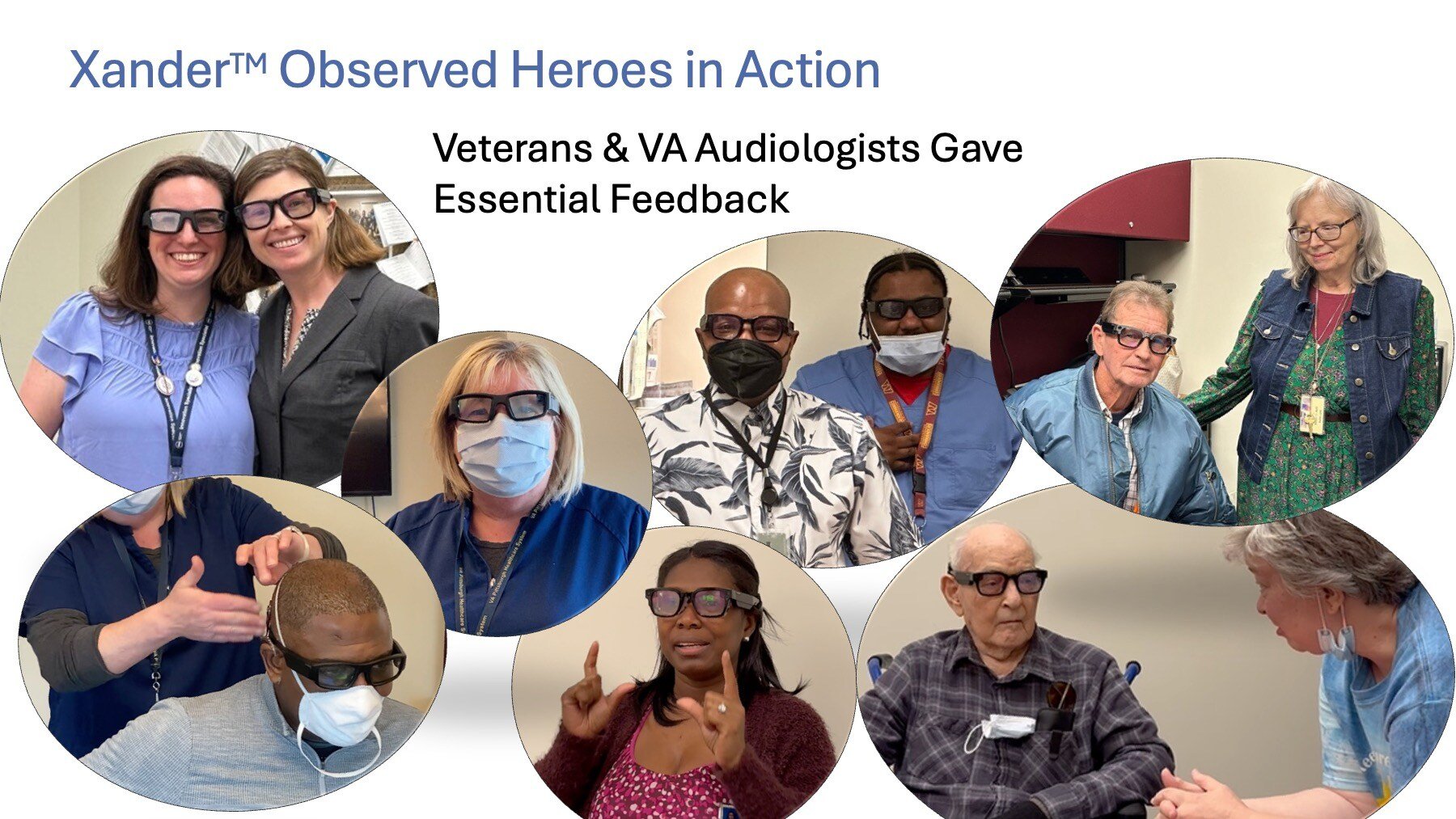In April 2025, Xander had the honor of exhibiting and co-presenting, “Communication Beyond the Sound Barrier: Initial Report on Xander Captioning Glasses” at the Joint Defense Veterans Audiology Conference (JDVAC). The annual conference, which began in 2001, brings together the Association of VA Audiologists (AVAA) — who treat U.S. Veterans — and the Military Audiology Association (MAA) — who treat active duty service men and women. JDVAC offers three days of programming—keynote speeches, panel discussions, sessions, and exhibits—featuring leaders in the field.

Image courtesy of JDVAC.
Dr. Benjamin Hornsby, Associate Professor in the Department of Hearing and Speech Sciences at the Vanderbilt Bill Wilkerson Center, delivered the opening keynote, “Listening is Exhausting! Hearing Loss and Listening-Related Fatigue.” Dr. Sam Bittel, a pioneering leader in neurology and audiology at the University of Kansas Medical Center, shared his findings on "Migraines in the Audiology Clinic."
Xander was eager to participate in this important conference! We set up an exhibit booth where audiologists tried the glasses and asked questions. Xander's co-founders were thrilled to co-present with audiologists who, for the past year, used XanderGlasses as an intervention to help Veterans with severe auditory disorders.

Photos: Alex and Marilyn interacting with booth visitors.
Veterans are disproportionately affected by hearing loss, and Xander’s co-founders come from families with generations of military service. We felt it was important to get feedback directly from Veterans and their caregivers as we developed our product. We were fortunate to be accepted into the i-NET Greenhouse Initiative under the Veterans Health Administration Innovation Ecosystem (VHA IE) in 2021. Kelsey Shull and Katie Braun, our lead Innovation Specialists, connected us with Veterans and audiologists who tested prototypes of the glasses and provided candid feedback. They became some of first users of XanderGlasses when the product became available.
Dr. Maureen Wargo (VA Pittsburgh Healthcare System), Dr. Lisa Boothe Rogers, and Dr. Trisha Milnes (Charlie Norwood Department of Veterans Affairs Medical Center) were the first VHA audiologists in the country to issue XanderGlasses to Veterans under their care. Did our captioning glasses improve speech comprehension and enhance communication for Veterans with severe to profound hearing loss, and other auditory disorders?
Throughout 2024, the doctors used the AzBio Sentence Test to evaluate the speech perception abilities of hearing-impaired Veterans using XanderGlasses. The goal was to assess if XanderGlasses affected comprehension and confidence in communication in different situations. Veterans were tested under two conditions—in quiet and noise—and in different ways—while wearing their optimized hearing devices —hearing aids (HA) or cochlear implants (CI) alone and while wearing their hearing devices while wearing XanderGlasses.
These early results are promising. Data collected from the first year of casual testing indicates “all patients had significantly better performance while wearing the glasses.” Results from a +10 S/N test suggest the glasses can offer significant assistance. Dr. Rogers noted, “in all cases, a dramatic increase in understanding was noted when wearing the glasses.” The chart below shows averages of AzBio Scores in different conditions.

Image courtesy of Dr. Rogers and Dr. Wargo, 2025.
I had quit going anyplace with my wife and really felt like my life was over. But since I have received these voice to text eyeglasses I feel better about socializing with people. Because now I can understand a lot about what is going on at the event by being able to see some of the conversation, which makes me feel like I am alive and not just a pebble sitting on a chair at the table. I can even join in with some of the conversation now.”
U.S. Veteran, Augusta, GA
One Veteran shared he had started “declining invitations for any social event that involved many people.” He elaborated, “I sit at the table and cannot understand anything going on, and I feel like I am nothing, sitting at the table. So I had quit going any place with my wife and really felt like my life was over. But since I have received these voice to text eyeglasses I feel better about socializing with people. Because now I can understand a lot about what is going on at the event by being able to see some of the conversation, which makes me feel like I am alive and not just a pebble sitting on a chair at the table. I can even join in with some of the conversation now.”

Image credit: Xander, 2025.
We feel especially proud of our collaboration with the Veteran's Health Administration. As a small, early-stage startup, we are grateful that the i-NET Greenhouse Initiative enabled us to work directly with heroes—Veterans and their audiologists. Observing these heroes in action inspired us to develop and refine our solution. We're thankful that our prodcut may help Veterans who lost their hearing or have trouble understanding speech to regain their confidence communicating in social interactions.